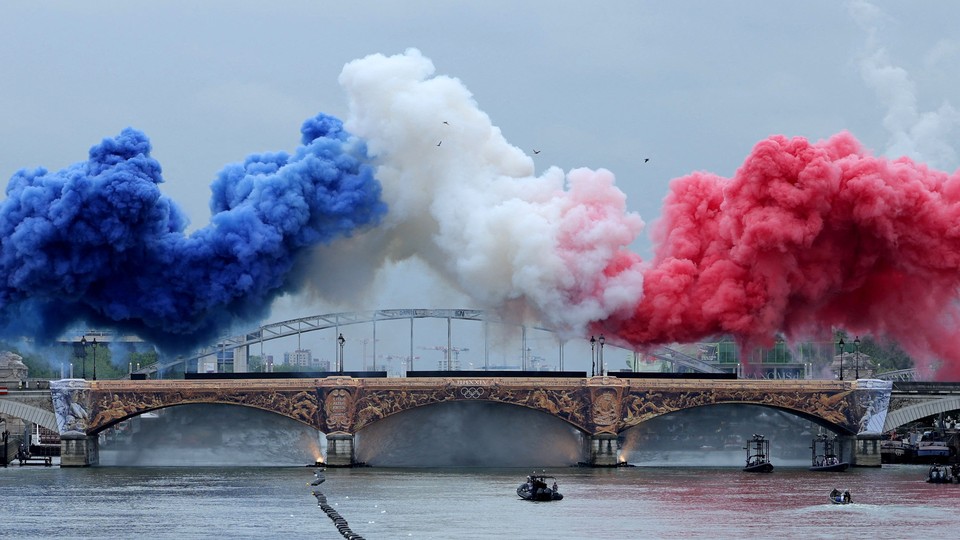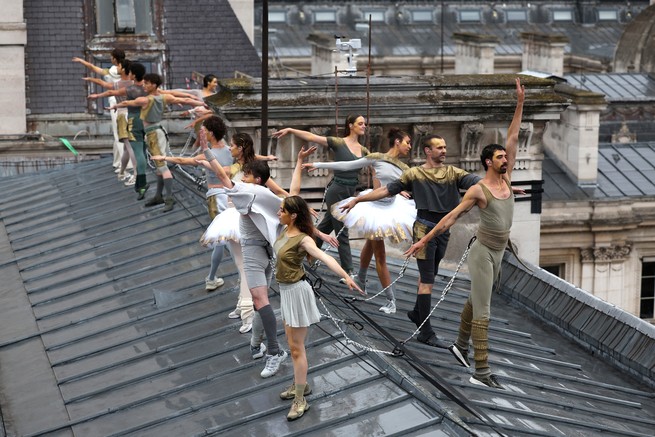A Mess on the Seine
4 min read
Well, that was a nice idea in theory. Paris held the first-ever Olympics opening ceremony to take place outside a stadium—and on one of the loveliest settings in the world, the Seine. Athletes paraded not by foot but by boat, waving flags from sleek cruising pontoons, as pageantry unfolded on bridges and riverbanks. The aquatic format promised to do more than just showcase the architectural beauty of Paris or convey the magic of strolling across the Pont Neuf with fresh bread in hand. It promised to offer the world—our ever more jaded, content-drowned world—something new to look at.
Unfortunately, that new thing was a mess. Some will blame the rain, which soaked the festivities for hours, adding an air of tragedy as athletes waved flags from within their ponchos. But even on a sunnier day, the ceremony would have served as an example of how not to stage a spectacle for live TV. The energy was low, the pacing bizarre, and the execution patchy. Paris tried to project itself as a modern, inclusive hub of excitement—but it mostly just seemed exhausted.
Olympics opening ceremonies are inevitably ridiculous affairs, usually in a fun way. The host nation must welcome the global community while cobbling all of the signifiers of its own identity into some sort of romping medley that also, ideally, expands that country’s image in helpful ways. London offered the Queen and James Bond, and also a tribute to the National Health Service. Rio hosted a rumbling dance party as well as a briefing on Brazil’s Indigenous history. Most important, both of those cities gave us good TV.
Beforehand, the Paris event’s artistic director, Thomas Jolly, announced his intentions to play with Gallic clichés. Key words—liberté, synchronicité, and so on—announced thematic chapters, but a narrative hardly cohered. Congratulations if you had the following on your bingo card: mimes, Louis Vuitton, parkour, Les Misérables, the cancan, lasers shooting out of the Eiffel Tower, allusions to ménages à trois. But credit where it’s due—I really did not foresee the Minions stealing the Mona Lisa and bringing it aboard a Jules Verne–style submarine. On reflection, that was the most educational part of the show: learning that a Frenchman co-directed Despicable Me.

One problem with this French fever dream is that much of it was prerecorded. Every few minutes, the telecast would cut to slick cinematography of a masked, hooded individual—that’s what the NBC broadcasters kept calling her, “the Individual”—sneaking the Olympic torch around. She went to the Louvre, where the paintings came to life. She went to a movie screening, where a Lumière-brothers film … came to life. These segments hit with all the force of a cruise-ship commercial, while distracting from the novelty of having a ceremony on water in the first place.
The live components of the show weren’t much more vibrant. A bridge was converted into a runway on which fashion models and drag queens strutted with the gusto and precision of a forced march. Platforms over the river itself featured extreme-sports performers doing tricks that the TV cameras seemed suspiciously afraid of showing in close-up. Lady Gaga put on a feather-laden cabaret performance that was perfectly fine, save for the fact that “perfectly fine” shouldn’t be anywhere near the name Lady Gaga.(As it turns out, that performance was prerecorded too.)
One of the only showstopping moments made clear that the weird vibes of the ceremony could largely be blamed on the detail work. At one point, the camera cut to a woman dressed as Marie Antoinette and holding her own babbling, chopped-off head. The heavy-metal band Gojira broke into riffage, and flames fired. This was righteous. But then, not much happened. Viewers were left to grow bored with static, wide shots of the performance. Eventually, a fake boat wheeled into view, looking quite a bit like a prop from a high-school play.
The best bits took place firmly on land. The pop star Aya Nakamura danced with the French Republican Guard in a flashy meeting of old and new cultural regimes. Once the sun set, “the Individual” emerged in real life to ride a cool-looking mechanical horse down the Seine. (It must be said that this journey was interminable.) The Olympic cauldron was cool too: It resembled a hot-air balloon, and it rose into the air when lit. To finish things off, Celine Dion made her seemingly unlikely return to singing, heaving with emotion from a deck of the Eiffel.
Perhaps it is no coincidence that carefully composed, largely stable images were the highlights of a show that tried to reinvent the Olympic ceremony in fluid directions. My favorite moment was when the pianist Alexandre Kantorow played Maurice Ravel’s Jeux d’Eau from a bridge as rain puddled on his instrument. He looked sad and soaked but also unbothered, lost in music. He made me remember the word I’d been trying to think of, for one of those ineffable French feelings: malaise.



